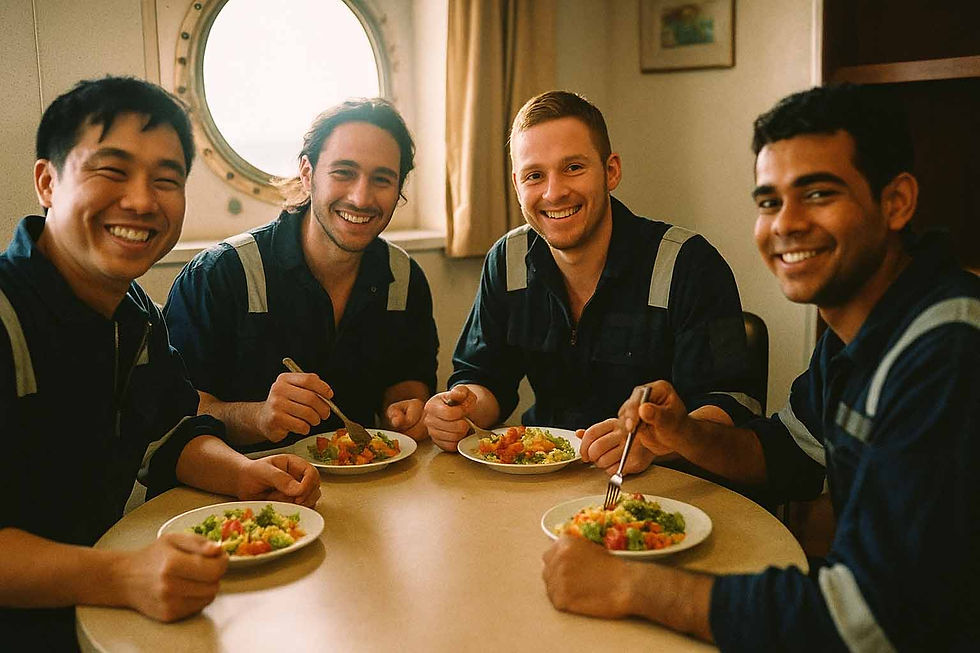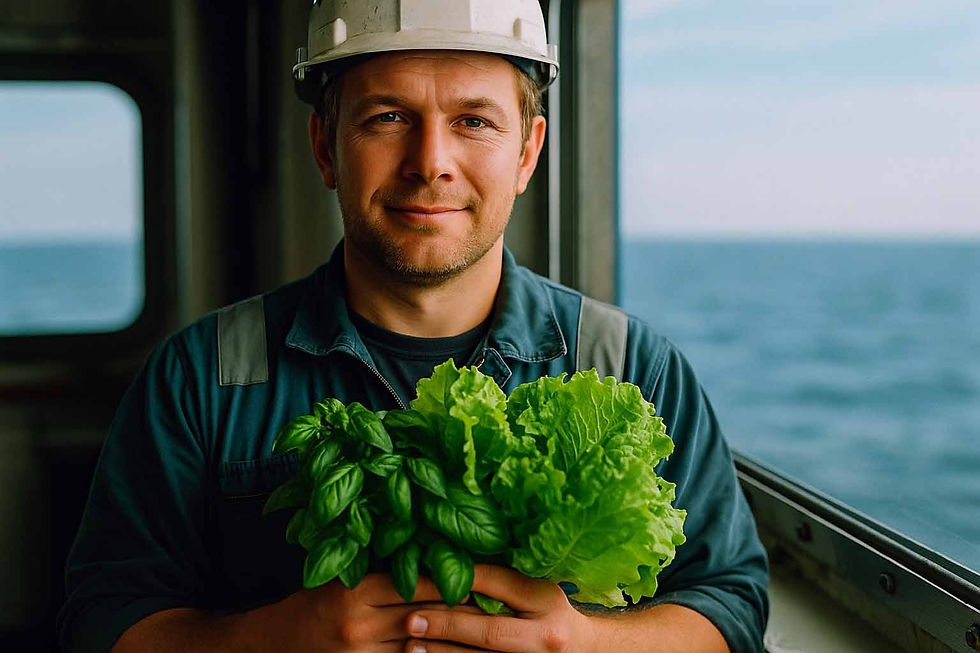Is fresh food the missing link in seafarer recruitment and retention?
- Aug 20, 2025
- 3 min read
By Oren Saar, CEO, Agwa

The maritime industry has long struggled with recruitment and retention, but the challenge is intensifying as younger generations bring new expectations to the table. Today’s seafarers are not just looking for competitive pay; they want safe, supportive, and healthy living conditions at sea. In fact, the quality of life on board has become a decisive factor – and food sits right at the heart of it.
For most vessels, the realist is stark: fresh vegetables typically run out after the first 10-14 days of a voyage. After that, crews rely on preserved, calorie-dense provisions that not only feel monotonous but also carry long-term health risks – from cardiovascular disease and diabetes to digestive issues and fatigue. It’s a diet that undermines wellbeing at the most fundamental level.
And nutrition is not just about physical health. It plays a huge role in morale, mental resilience, and day-to-day performance. Research from Cardiff University’s Seafarers International Research Centre found that 40% of senior officers report symptoms of mental distress, sleep deprivation, and chronic fatigue, while dissatisfaction with catering (especially the lack of fresh fruit and vegetables) remains widespread. Encouragingly, alcohol, tobacco and fried-food consumption are declining, pointing to a broader shift in expectations.
This challenge is even more pressing in the context of a projected shortfall of 90,000 seafarers by 2026. To attract and retain talent, shipping must do more than tick boxes. Younger seafarers are used to health-conscious diets, autonomy, and environments that support their mental wellbeing. When meals at sea are repetitive and over-processed, the
disconnect with life ashore can become a deciding factor in long-term career choices.

Regulations are beginning to catch up. The Maritime Labour Convention (MLC) already recognises nutrition as a seafarer’s right, and new amendments effective December 2024 reinforce the requirement for fresh, balanced, and culturally appropriate meals. This is a welcome step forward – but regulation alone doesn’t guarantee meaningful change.
At Agwa, we believe food can be more than fuel – it can be a visible sign of care. Our onboard farming systems allow crews to grow their own fresh vegetables, cost-neutrally and with minimal involvement. Each unit supports around 40 varieties of leafy greens and herbs, chosen for fast growth and nutritional value. Crews can even personalise what they grow. For example, Filipino seafarers often choose pak choi and Thai basil, while Indian crews have asked for spinach and coriander – spinach is now in development based on this feedback. For many, it’s not just about having something fresh to eat; it’s about eating food that feels like home. That familiarity can make a profound difference on long voyages.
The benefits go beyond diet. The simple presence of living plants onboard, and the shared act of tending and harvesting them, creates moments of connection and stability. Crews tell us it breaks the monotony, boosts morale, and provides a small but meaningful sense of control in a highly structured environment.
Importantly, this can be achieved without adding cost. Ships typically spend about $0.50 per crew member per day on fresh vegetables. With Agwa, they spend the same but have a reliable supply year-round instead of just the first two weeks. Operators typically save between $5,000 and $10,000 per vessel per year by avoiding spoilage and overpriced
port-supplied produce. Beyond cost, there’s the nutritional value: research shows lettuce loses nearly half its vitamin C within just two days of harvest – and more than 80% after a week. By growing onboard, crews can enjoy vegetables at their freshest and most nutritious.
The systems are already in use across fleets operated by Maersk, EPS, Ango-Eastern, Synergy, NYK, Capital, Angelakos, and others. The feedback is consistent: morale improves, food quality improves, and crews feel more cared for. And because the technology is built around automation, AI, and mobile apps – the same tools younger seafarers are already used to – it feels intuitive and easy to adopt.
The business case is equally compelling. High turnover is expensive: the Society for Human Resource Management estimates replacing an employee typically costs 6-9 months’ salary. Operators using Agwa’s systems report retention improvements of 5-10%, translating to savings of $20,000 to $30,000 per vessel per year. At the same time, each device reduces food-related emissions, water use, and packaging waste – cutting up to 9.9 tonnes of CO₂e and saving more than 8,000 gallons of water annually. These are tangible contributions to both ESG performance and crew wellbeing.
In an industry where margins are tight and skilled officers are in short supply, prioritising welfare isn’t just the right thing to do, it’s a hard advantage. Fresh thinking about food goes beyond dietary improvement; it’s an investment in loyalty, resilience, and the long-term sustainability of global shipping.
